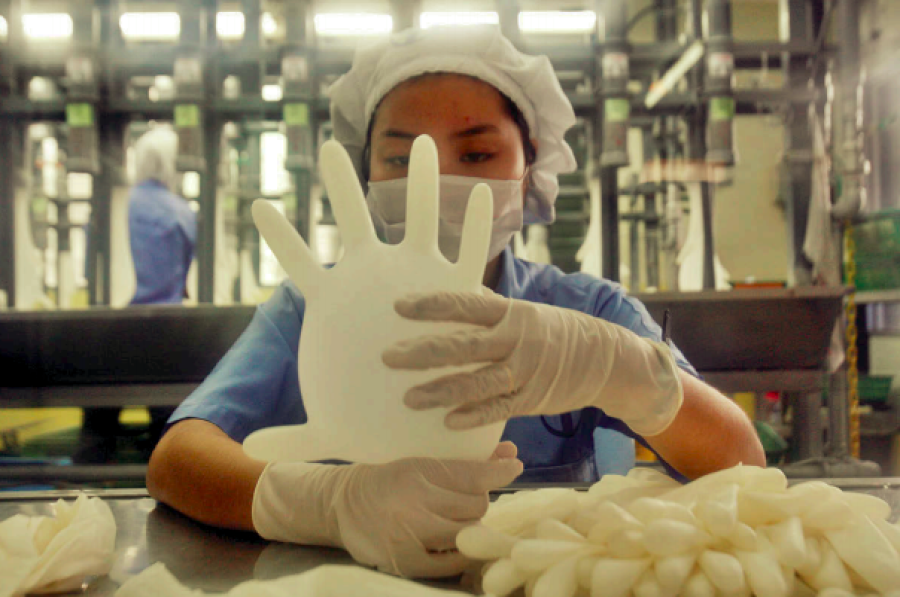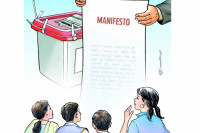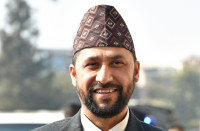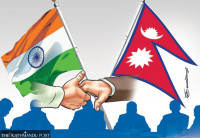National
More Malaysian companies reimbursing Nepali workers for recruitment fees
The move comes as several glove manufacturers are forced to comply with zero-cost job policies to meet international benchmarks to avoid sanctions.
Chandan Kumar Mandal
In late 2012, when a migrant worker from eastern Nepal wanted to work in Malaysia, he paid Rs 105,000 to a recruiting agency based in Kathmandu to find a job in a glove manufacturing company.
“I didn’t have to take a loan at exorbitant interest rates as I could borrow from relatives,” the migrant worker, who didn’t want to be identified, told the Post from Malaysia over phone.
For years, migrant workers like him continued to pay huge amounts to sub-agents and recruiting agencies for jobs in Malaysia and the Persian Gulf, according to the worker, who is now 28.
“Once I approached a recruiting agency for a free-visa-and-free-ticket job for my friend. But they simply refused. Even for jobs in which employers are willing to bear medical examinations and other related fees, such agencies make poor workers pay for their placement and other pre-departure services,” he said.
But now, hundreds of workers like him, especially those working for glove-making companies in Malaysia, are likely to be reimbursed the amount they paid for securing their jobs. A number of Malaysian companies, one after another, have come forward to reimburse their workers who often come from South Asian countries after paying exorbitant fees to recruiters.
With the pandemic, rubber glove manufacturers in Malaysia, which produces almost 70 percent of the gloves sold around the world, are working in overdrive. The companies, eyeing large global markets, agreed to reimburse their workers after the United States’ Customs and Border Protection (CBP) imposed a ban on their products over forced labour charges.
The company the man from eastern Nepal worked for, Top Gloves Corp Bhd, decided to reimburse recruitment fees and other related costs to its thousands of workers. “The news came as a surprise to me,” he said.
“I haven’t heard the news myself. It is still difficult for me to believe it as something like this has never happened before,” he said. “Workers are known for paying to secure jobs. But if it happens for real, then of course we would be happy.”
Last month, WRP Asia Pacific, a leading glove maker, announced its remediation programme which would benefit 1,600 foreign workers, including nearly 600 Nepalis. These workers will get their recruitment fees and other related costs reimbursed. Each worker could receive 4,547 Malaysian Ringgit to RM 16,054 (approximately Rs129,000 to Rs458,000) within the next 30 months.
Likewise, Top Glove, last week, decided to refund upto RM50 million to its workers to cover their recruitment investments. Top Glove has more than 6,000 Nepali workers and the same number of workers from Bangladesh, according to the Nepali worker.
Hartalega Holdings Bhd, another glove maker, on Monday, announced its plan to reimburse a total of up to RM40 million.
All these Malaysian companies have come with remediation packages to abide by the zero recruitment cost policy and send out a message against international allegations that the companies have exploitative working conditions and their products were part of forced labour.
“If 6,000 Nepali workers of Top Glove get around $1,500 each, that’s $9million dollars,” said Andy Hall, a Kathmandu-based migrant workers’ rights specialist working in South and South-East Asia.
He expects that by the end of 2020, if Malaysian glove companies are to avoid further US CBP forced labour sanctions, they will commit $70-80 million to reimburse workers from Bangladesh and Nepal their recruitment fees.
Top Glove is the world's largest glove manufacturing company with 45 factories—40 in Malaysia, four in Thailand and one in China. With an annual production of 80.2 billion pieces of gloves, it has nearly 20,000 employees.
On July 15, the US agency clamped a ban on disposable gloves manufactured by Top Glove’s subsidiaries, Top Glove Sdn Bhd and TG Medical Sdn Bhd, due to suspected foreign labour issues. WRP also faced similar sanctions last September.
Migrant rights activists say glove-making companies agreeing to reimburse poor workers is a praiseworthy decision.
“The decision to return recruitment fees and other costs is encouraging news. If they have agreed to implement and respect the employers’ pay model, then it is commendable,” said Rameshwar Nepal, a labour migration researcher. “But let’s not hope that this is just a one-time incident used to just avoid sanctions and send a message that the companies take care of their employees during the pandemic.”
For several years, Nepali workers have been paying exorbitant fees, often managed at high interest rates, to fund their overseas jobs with modest incomes and unsafe working and living conditions. Good-paying jobs come with higher recruitment fees.
According to Nepal, who is also the South Asia director at Equidem Research, a UK-based human rights research organisation, the decision signals the companies want to retain their workers who might return home during the pandemic, and this could lead to a shortage of workers in the future.
“Chances are that these employers already knew about the whole recruitment chain and how workers from these countries were supplied. There are international obligations that talk about zero cost jobs and making employers responsible under the UN Guiding Principles on Business and Human Rights,” said Nepal.
Nepal and Malaysia have signed a labour agreement that made provisions for zero-cost jobs to Malaysia-bound Nepali workers but workers are still paying for such jobs.
“Whilst today’s press announcements from Hartalega and Top Glove are welcome, there are considerable lapses in the remediation policies and practices of the major gloves companies in Malaysia,” said Hall.
“First, the payback period is too long and needs to be made shorter to take workers out of debt bondage and high-risk of forced labour. Second, remediation of workers still recruited at high costs even after the implementation of zero-cost/ethical recruitment policies in 2019 has yet to be considered part of these calculations.”
Hall further pointed out that remediation of former workers who have been repatriated or laid off from the companies in the past has also not been incorporated in the remediation programmes, and some companies have set arbitrary cut-off dates.
Meanwhile, the Top Glove employee from Nepal plans to return home in September if regular flights resume.
“If I get back Rs 100,000, that’s a lot of money for me and my family,” he said. “If I actually receive the money, I will throw a big party for my friends when I return home.”




 11.12°C Kathmandu
11.12°C Kathmandu















